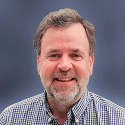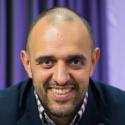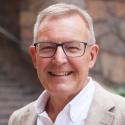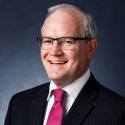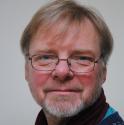2025 Apologetics (Advanced) Network
- Image
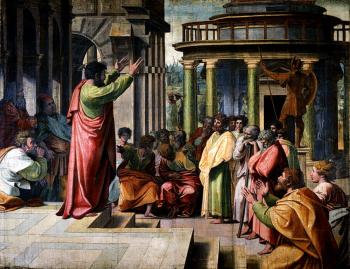
What did the Apostle Paul do when Pre-Christian Europe was pagan, relativistic, and pluralistic? He did apologetics among his contemporaries; Paul went to the Jews arguing from the Old Testament Scriptures that Jesus was the Christ and to the pagan Greeks using their literature and cultural artifacts to argue that the "unknown God" has been revealed and proclaimed in Jesus.
21st century Europe is in a state very similar to Paul's time and needs gifted apologists who can demonstrate that Christianity is true and relevant. Therefore, the vision of the European Apologetics Network is to train a new generation of apologists who can stand in today's marketplace of ideas in the way that Paul did in his generation. Our desire is to develop apologists who will testify to the truth of the Gospel with wisdom, versatility, and courage in their efforts to persuade their contemporaries.
The Advanced Apologetics Network has been formatted to function as an interactive learning experience that flows with a common theme. Based on participants’ feedback, the new format will provide three essential components to support apologetic endeavor in Europe:
- Knowledge: Network participants will learn from leading apologists, philosophers, and scientists, being equipped to engage some of the crucial issues of our time with fresh perspectives.
- Skills: Our updated format includes an emphasis on practical skills development. Participants will be challenged to put into practice what they've learned in interactive formats, including developing arguments and content ideas.
- Community: By joining the Network, participants become part of a community of apologists. The new Network design will provide opportunities to connect with like-minded Christians, exchange know-how, and work together on future collaborations. We envision that this community will continue throughout the year online.
What Network Participants Are Saying
- "Being at ELF was so helpful for me because I had the ability to learn from faithful and experienced leaders. I learned how to approach unbelievers in a friendly and biblically faithful way in cultural apologetics. Also, I learned valuable ways to equip church members to share the gospel with their friends in their neighborhoods and workplaces." - Zsolt Kapitany, Pastor of Pestszentimre Baptist Church, Hungary
- "Being at the European Leadership Forum is so exciting and encouraging. I had the amazing opportunity to meet experienced academics and apologists, gifted speakers, devoted Christians, and faithful brothers and sisters in Christ. The information and knowledge I received through the Apologetics Network are of great help to me, challenging me to invest in my training, abilities, and calling."
- Teodor Colda, Vice Academic Dean of Baptist Theological Institute, Romania - "The European Leadership Forum has become like an elder brother who holds the hand of a toddler and teaches them to work. I started experiencing the benefits of the Forum last year with the Year-Round Mentoring program, where I was able to share the challenges of my context with my mentor; he helped me to find tangible solutions to my problems. I have now received encouragement from leaders from all over the world in the Apologetics Network and can say that I am now encouraged to keep serving God, knowing that I am not alone."
- Danson Ottawa, National Coordinator of Africa Center for Apologetics Research, Kenya
Applicants should be those with evangelistic or apologetic gifts who have first attended the European Apologetics Network: Foundational Track and the European Evangelism Network. The purpose of the Network is to train, mentor, equip, and resource those evangelists and apologists who are seeking to communicate the Gospel in their local communities. Prior preparation will be set for all applicants.
Network Leadership
Network Speakers
Andrew Fellows was appointed pastor of a church in Bradford, West Yorkshire in 1988 where he served for seven years. In 1995 his family moved to the English branch of L’Abri Fellowship, where they lived and worked for 21 years. From 2011 to 2016 Andrew was the chairman of L’Abri International.… Read more
Alexander Fink is Director of the Institute for Faith and Science (Institut für Glaube und Wissenschaft) in Marburg, Germany (www.iguw.de). He studied physics at Bayreuth and St. Andrews (UK) universities and received his PhD at the Institute for Biophysics at… Read more
Stefan Gustavsson is a member of the European Leadership Forum Steering Committee. He is the director for Apologia – Centre for Christian Apologetics and makes his home in Stockholm. He was the founding general secretary for 16 years of the Swedish Evangelical Alliance. Stefan travels widely… Read more
David McIlroy is a practising barrister based in London in the UK. He serves on the editorial board of Law & Justice, teaches the Mission of Justice and the Theology of Law course at Spurgeon’s College, and is a Visiting Professor at the University of Notre Dame (USA) in England. He is… Read more
Mihail Stefanov is the assistant pastor at Crossroad’s Church Sofia (crossroadchurch.bg) and the founder of Culture and People (cultureandpeople.eu) – an international consulting firm helping global business leaders transform the culture of their organizations. He has a deep passion for… Read more
Christopher Townsend chairs the editorial group of Cambridge Papers, a quarterly publication with the strapline ‘Towards a Biblical Mind’, which aims to help Christians engage with a complex and changing world (www.cambridgepapers.org). He wrote ‘… Read more
Network Programme
Sunday, 18 May
In this session, you will discover how you can sharpen your arguments by leaving key premises unstated, drawing your audience into the reasoning process. Through practical examples and exercises, you’ll learn how to craft concise, persuasive arguments that resonate deeply, whether addressing sceptics or building connections with people open to the Gospel. You'll also be equipped to disarm the power of your opponent’s arguments by exposing and addressing hidden assumptions in their reasoning.
We live in the anthropocentric age which means that underneath every worldview commitment is a deeper obligation to the self. In this talk we look at how divine attributes have been downloaded to the modern self and the implications for all our apologetics.
Monday, 19 May
What does it mean to be human in a created world? Or to be a human created in the image and likeness of the Creator? And even more: what does it mean to be a fallen creature? In this big-picture lecture, we will explore the biblical anthropology in relationship to our experience of being human, with all the struggles and tensions it entails. And we will explore the differences the gospel makes for our understanding of human life.
The human brain is one of the most complex objects in the known universe, and its incredible performance impacts every area of our lives. The question may arise: Am I nothing but my brain; am I more than my brain? Certainly, there are links between brain function and our personality. But does that show that we are purely material beings? Is consciousness only a function of the brain? Has neuroscience refuted the notion of free will and personal responsibility? Are religious faith and our concept of God just products of neuron function? What does the Bible teach about our brain and our soul? In this talk, we wrestle with these issues. These questions are not only scientifically interesting but have a deep impact on understanding our own identity as human beings.
Tuesday, 20 May
There are, and probably always have been, few consistent moral relativists. How do atheists account for objective morality? What would morality look like if people followed these moral rules? This session will discuss how to present arguments for moral realism (i.e., the idea that some moral rules are objective) and how to respond to the arguments of those thinkers who affirm moral realism but deny that our consciences and moral beliefs are evidence for a supreme law-maker. It will also explore how we can develop arguments to show that the best explanation for objective morality is the existence of God who wants to see human beings and the rest of creation flourish.
This session will offer an overview of the ‘strange new world of gender’, its key ideas and its impact on society. We will look at the roots of ‘gender identity’ theory and the public debate on ‘gender ideology’: what arguments have been deployed, by whom and with what success? We will examine different interpretations of the biological characteristics of sex, the weak evidence base for the medical care for gender-questioning patients, and expose several common myths in this field. During this seminar, we will consider several key biblical themes (perspectives on our physical bodies, sex, gender, identity, and suffering) and biblical attitudes (such as compassion, conviction, courage, and wisdom) which play a part in framing a Christian response.
Wednesday, 21 May
Welcome to the Relentless Podcast! The final day is entirely allocated to practice and method, focusing on an interactive role-play activity.
In this first session, participants take on the role of Christian apologists, invited as guests to the Relentless Podcast live show. There they are grilled by the two hosts on a variety of difficult topics.
Welcome to the Relentless Podcast! The final day is entirely allocated to practice and method, focusing on an interactive role-play activity.
In this second session, participants engage in feedback and brainstorming on improving their communication strategies, arguments, and overall defence of the Christian position.

